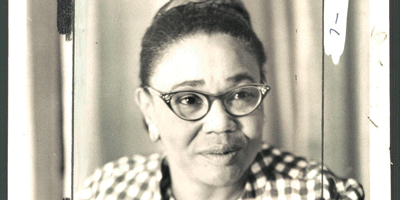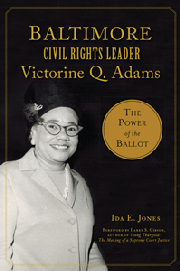Baltimore native Victorine Quille Adams became the first black woman elected to the city council and proved herself as a civic leader and pioneer in African American politics.
Born in 1912, Adams lived through stringent segregation, racial violence and economic turbulence.
She attended Morgan State and Coppin State universities and, according to a new book, she took to the classroom and enriched the lives of her students.
In 1946, she founded the Colored Women’s Democratic Campaign Committee to educate African American women about the vote and the power of the ballot box.
In concert with fellow educators Mary McLeod Bethune, Kate Sheppard and Dr. Delores Hunt, Adams persisted in educating and empowering voters throughout her life.
Author Ida E. Jones, who serves as archivist at Morgan State University, revealed the story of Adams and her crusade for equity for all people in Baltimore in Jones’ new book, “Baltimore Civil Rights Leader Victorine Q. Adams: The Power of the Ballot.”
“She was a force so imposing that she couldn’t be overshadowed by any man— not even her husband, the Baltimore gambling kingpin, William ‘Little Willie’ Adams,’” Jones writes in the book.
“When some suggested that she won the 1967 election solely because her wealthy husband financed her campaign, she wrote the following rebuttal: ‘I should be regarded not only as the wife of Willie Adams but as a woman who has used her influence and affluence to better the community in which she lives,’” Jones said.
In capturing Adams’ story, Jones says she sought to document all the various lines that Adams crossed in her 93-year life including racial, gender and voter registration.
Following Adams’ death in 2006, then Baltimore City Council President Sheila Dixon was among the many who paid tribute.
“She was a very fiery woman at a time when, in city government, women were in the minority,” Dixon said. “That kind of a voice for those who didn’t have a voice was so key to city government.
In 1946, Adams founded the Colored Women’s Democratic Campaign Committee reportedly to mobilize support for candidates who were sympathetic to black causes. From her living room, Adams pushed for change and African American voter registration.
She was credited with helping to state a key victory in 1954 when Judge Harry A. Cole, a young black Republican lawyer, won a state Senate seat over a white Democrat.
In 1962, Adams ran unsuccessfully for state Senate but four years later she won election to the House of Delegates. One year later, Adams resigned from the House of Delegates and won election to Baltimore City Council— a seat she held for four terms.
Among her vast accomplishments, Adams led fundraising efforts for the former Provident Hospital, the city’s only minority-owned hospital. She served as a member of the National Council of Negro Women; was a delegate to the Democratic National Convention in 1964; and served as a local election campaign director for President Lyndon B. Johnson.
“The lady always looked out for people in need.
Always,” then State Sen. George W. Della Jr., told reporters after Adams’ death in 2006. “That is what she was in public office to do, to make things better for those in need and she did a great job.”

